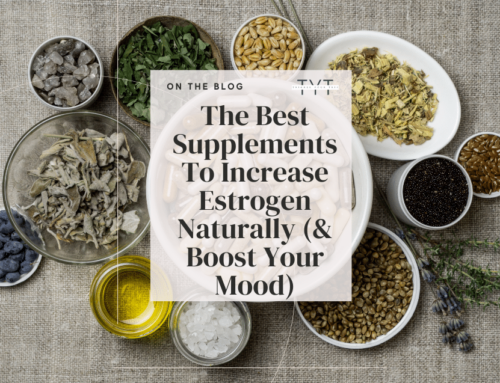Skin health is a paramount part of our well-being, often disregarded. The quality of our skin can be influenced by multiple factors, ranging from hereditary traits and lifestyle choices to the surrounding environment.
While skincare products available in the market are countless, a vitamin-rich diet, including vitamin E and vitamin C, also significantly contributes to keeping the skin in good condition.
Specifically, vitamins E and C are essential elements our bodies require for optimal functioning; these vitamins play an integral role in preserving the skin’s vivaciousness.
Within this write-up, we will explore each of the nine leading vitamins stimulating skin health – vitamins E and C included – which may positively impact rejuvenating your skin surface with a luminous sheen.
We’ll discuss how these vitamins boost overall dermal health, providing insights on integrating them effectively into your dietary routine and maximizing their advantages.
Remember, achieving good skin isn’t just about applying products externally. So, let’s explore how these vitamins contribute to the skin and help you achieve that radiant glow.
Read More: The 12 Best Supplements To Increase Estrogen Naturally
The Different Skin Types
Before we dive into the importance of vitamins, specifically vitamin E and vitamin C, for skin health, it is essential to understand the different skin types.
Knowing your skin type is crucial in determining the proper skincare routine and identifying which vitamins, such as E and C, will benefit your skin the most.
There are four main skin types – normal, dry, oily, mixed, and sensitive. Normal skin has a balanced oil and moisture level, while dry skin lacks moisture and may feel tight or itchy. Oily skin produces excess sebum, causing a greasy shine, and mixed skin has both dry and oily areas.
Normal Skin
Typically viewed as the ideal skin type, normal skin balances moisture and oil levels. People with this skin type may occasionally suffer from breakouts or dry spots, but generally, their skin appears healthy and glowing.
For those blessed with normal skin, the focus should be on preserving this equilibrium by ensuring their skin stays hydrated and shielded from environmental elements.
Adding vitamins to your skincare regimen, especially vitamin E and vitamin C, can bolster the health of your already harmonious skin, leading to even better skin conditions.
Oily Skin
Oily skin is defined by an over-secretion of sebum, the skin’s natural oil. This surplus oil can block pores and result in acne flare-ups. Individuals with oily skin often exhibit a glossy look and might find it challenging to keep their makeup intact.
Those grappling with oily skin should opt for products that control sebum production and maintain unobstructed pores. Vitamins, notably vitamin E and vitamin C, can be instrumental in managing oily skin and minimizing breakouts, leading to improved skin health.
Dry skin
Individuals with parched skin usually experience tightness, skin irritation, or itching due to insufficient moisture. These people may face unpleasant conditions like flaking, reddening, and pale lines.
Essential vitamins, particularly Vitamins E and C, can enhance the overall wellness of dry skin while also soothing common symptoms, ultimately boosting its appearance.
Vitamin D is another essential vitamin that plays a pivotal role in healthy skin by lessening irritation and keeping skin hydrated.
Individuals can contribute towards revitalizing their complexion and maintaining its radiant glow by including these crucial vitamins in their daily skincare routine.
Mixed skin
Lastly, combination or mixed skin mixes dry and oily areas. This skin type can be tricky to manage as different areas require different treatments. People with mixed skin may have an oily T-zone (forehead, nose, and chin) and dry cheeks.
Using products that balance the skin’s oil production while providing moisture where needed is crucial for optimum skin health. Vitamins like E and C can significantly manage combination skin, contributing to overall skin.
Sensitive skin
The skin of this type is susceptible to inflammation, discoloration, and adverse reactions to specific products or surroundings. It can also be indicative of underlying health issues.
It’s vital for individuals with this kind of skin to choose skincare products that are gentle and to avoid those with harsh chemicals and fragrances. Vitamins C and E are known to be effective for this skin type. This is because they can assist in pacifying and safeguarding sensitive skin. This makes them a key element of your skincare routine for enhancing the health of your skin.
Read More: The 9 Best Anti-Inflammatory Supplements You Need To Be Taking
Do Vitamins For Skin Health Actually Work?
Vitamin supplements play a vital part in maintaining optimal skin health. It supplies our bodies with the necessary nutrients required for proper functioning. Regarding skin wellness, specific imperative vitamins are recognized for showing particular advantages. Omega-3 fatty acids are one such vitamin known for their ability to bolster our skin’s protective function and sustain overall health.
These vital micronutrients like Vitamin A, C, and E effectively preserve the skin’s unsophisticated functionality, shielding it from external environmental wear and tear while helping its self-repairing mechanism and rejuvenation process.
Vitamin A performs explicitly commendably in promoting cell development and differentiation aspects, thereby assuming critical functions related to the healthy construction of surface layers on the skin.
It further enhances natural hydration levels, resulting in radiant-looking healthy skin while displaying potential smoothing effects over wrinkles, tightening facial features via boosting collagen synthesis, and reducing over-pigmentation conditions.
Vitamin C, well-known for its robust antioxidant properties, contributes to core skin well-being aspects apart from shielding against harmful ultraviolet rays and free radicals elements and preventing skin cancer. Additionally, it is seen performing a significant role in collagen manufacturing, leading to evening out of skin tone overall, safeguarding against possibilities of malignant growths crucial for maintaining firmness elasticity levels; regular application can positively affect the texture.
In conclusion, vitamin A, C, E, and Omega-3 fatty acids are the best vitamins for promoting skin health. They provide antioxidant protection, stimulate collagen production, support wound healing, and maintain skin hydration. However, they should be used in moderation and as part of a balanced diet for optimal skin health.
I constantly try to have a balanced diet, but having the necessary vitamin intake from my food alone is impossible. That’s why I’m a fan of the NutriGenesis Multivitamins, which can supply 100%+ Daily Value of 17+ vitamins and minerals in formulas customized for women, and it can be the starting point of fueling your body with relevant vitamins.
The NutriGenesis Multivitamin contains all the necessary nutrients a woman’s body needs. Even if you have a balanced diet, fueling your body with all these vitamins daily is impossible.
What Vitamins Help Clear Skin?
Several vitamins are known to be beneficial for skin health and can help clear the skin.
Vitamin A
Regarded as retinol, Vitamin A plays a pivotal role in preserving skin health and has gained scientific standing in clearing skin problems. Crucially, this potent compound aids in governing the skin’s cell cycle turnover rate, thereby promoting sloughing off of dead skin cells and reducing occurrences of clogged pores, which often result in acne formation.
There is also a noticeable reduction in sebum release. Sebum is an oily substance that, when produced excessively, can lead to the prominence of acne blemishes. Furthermore, it supports wound healing and promotes collagen development, a protein vital for sustaining skin’s flexibility and tautness. Yet excessive consumption can lead to undesired effects such as dryness and irritation.
It is crucial to note the potential drawbacks of consuming Vitamin A, even though it could benefit skin wellness, such as unwelcomed dryness and possible irritation.
Vitamin C
Vitamin C is a dynamic nutrient for healthy skin conditions and has several benefits. As an antioxidant, it battles against harm by free radicals to our skin cells, preventing skin cancer.
Applying Vitamin C topically, usually found in serums, stimulates fresh collagen formation, which also aids in lightening hyperpigmentation by inhibiting melanin production enzymes at play, resulting in dark spot formation primarily responsible for this condition.
Vitamin C serums have gained popularity as one of the top-notch nutrients for maintaining youthful and vibrant skin. These serums exhibit a vital role in protecting skin cells from sun damage, keeping skin healthy while simultaneously assisting in rejuvenating damaged skin.
Vitamin E
Vitamin E, a robust antioxidant, safeguards the skin from harm inflicted by free radicals and environmental hazards like pollution and ultraviolet radiation.
The primary virtue of Vitamin E is its capacity to expedite the healing of wounds and rejuvenation of tissues, which can aid in diminishing acne scars and refining the skin’s texture.
Furthermore, Vitamin E is pivotal in preserving the balance of the skin’s oil, preventing severe dryness that could lead to breakouts. It also amplifies skin hydration by bolstering the skin’s inherent barrier strengths.
Despite these beneficial properties, it is suggested that Vitamin E be employed under the supervision of a healthcare practitioner or dermatologist, as overindulgence could lead to skin reactions.
Vitamin D
Vitamin D, known as the “sunshine vitamin,” is renowned for its anti-inflammatory properties that can calm skin irritation and decrease redness linked to conditions like acne. Moreover, this essential nutrient fortifies the skin’s defense mechanism while governing the production of skin cells and sebum, aiding in maintaining a clearer complexion and tending to skin problems such as acne.
Furthermore, Vitamin D also plays a role in preserving a protective barrier against sun damage.
Moreover, adequate Vitamin D supports the immune system, assisting the body in fending off bacteria and infections. It also has a critical part to play in generating collagen – an essential protein closely tied to skin elasticity and retaining youthfulness.
Nevertheless, it is advised to exercise caution as excessive intake of Vitamin D could potentially lead to undesirable side effects, including the development of skin rashes. Hence, it is highly recommended that its usage be done under proper medical supervision or dermatologist guidance.
Vitamin K
Vitamin K, though not as widely recognized, can offer notable advantages for skin health. It’s chiefly acknowledged for its role in facilitating the blood clotting process in the body, which can speed up healing wounds, bruises, and areas impacted by surgery.
This nutrient also contributes to mitigating inflammation and redness, which can prove helpful for individuals contending with acne or other inflammatory skin conditions.
Moreover, studies have suggested that Vitamin K can help diminish under-eye circles and spider veins, enhancing overall skin appearance.
It’s also believed to help maintain skin elasticity and prevent signs of aging. However, as with any vitamin or skincare product, it’s important to use Vitamin K appropriately and under professional guidance to avoid potential side effects.
B Vitamins
Promoting skin health is a critical role of B Vitamins. For example, a nutrient known as Vitamin B3, or Niacinamide, possesses characteristics conducive to reducing redness and inflammation often accompanied by disorders such as rosacea or acne.
It also boosts hydration levels for your skin, thereby lessening the visual impact of wrinkles and fine lines. Moreover, it enhances the overall functioning of your skin’s natural barrier.
An alternative name for Vitamin B5 is Pantothenic Acid, which improves skin barrier function, thus offering protection against acne breakouts. A compound known as Vitamin B7 or Biotin proves crucial in positively influencing our hair, skin, and nails.
Besides these, there is yet another vitamin aptly named Vitamin B12, which aids in inhibiting pigmentation, preventing dark spots or patches on your skin.
Nevertheless, an important reminder regarding excessive amounts of it sometimes results in skin breakouts; hence, it’s important to monitor your biotin levels.
Read More: The Best Face Mask for Men for a Perfect Self-Care Weekend
Vitamin H (Biotin)
Also known as Biotin, Vitamin H plays a vital role in maintaining healthy skin by significantly contributing to fatty acid metabolism, which is an essential process for keeping one’s skin health stable.
These fatty acids ensure the skin remains nourished and hydrated, preventing wrinkles and dryness.
Always consult a healthcare provider before starting any new supplement regimen.
Vitamin F (Essential Fatty Acids)
Vitamin F, also known as EFAs, comprises Omega-3 and Omega-6 fatty acids. These EFAs are crucial for healthy skin. They play a vital role in establishing the skin’s natural oil barrier, which helps keep the skin hydrated, plump, and youthful-looking. Notably, Omega-3 fatty acids have anti-inflammatory properties that help alleviate common skin conditions like rosacea or eczema.
By ensuring a balanced intake of these EFAs, you can prevent dryness and imperfections on your skin, promoting a clearer complexion. Additionally, they aid in repairing the skin, reducing redness, and controlling inflammatory acne.
Vitamin P (Bioflavonoids)
Bioflavonoids, commonly known as Vitamin P, have powerful antioxidant properties that play a crucial role in protecting the skin against free radicals. This dynamic combination helps combat wrinkle formation, maintain skin firmness, and promote overall skin health.
Moreover, bioflavonoids possess anti-inflammatory effects that can effectively reduce redness and inflammation in the skin. As with any new supplement regimen, it is advised to consult with a healthcare professional before incorporating it into your routine.
Vitamin J (L-Carnitine)
L-carnitine, or Vitamin J, is crucial for maintaining healthy skin. It helps regulate the movement of fatty acids and reduces sebum production, a food source for acne-causing bacteria. This ultimately leads to fewer breakouts. Additionally, L-carnitine is an antioxidant, protecting the skin from harmful particles that can cause damage. As always, it’s essential to consult with a healthcare provider before starting any new supplement routine.
BONUS TIP:
Unless your body has a specific supplement deficit (like Iron or vitamin D deficit), I suggest taking a multivitamin instead. My favorites are the NutriGenesis Multivitamins,which can supply 100%+ Daily Value of 17+ vitamins and minerals in formulas customized for women, and it can be the starting point of fueling your body with all the relevant nutrients.
Do Dermatologists Recommend Vitamins?
Expert advice on using dietary supplements and vitamins to promote healthy skin and generate new skin cells tends to vary based on individual needs, environmental factors, and current scientific knowledge.
The American Academy of Dermatology points out insufficient conclusive evidence to recommend particular supplements universally. Nonetheless, they concur that specific vitamins, including Vitamin C and D, have exhibited positive outcomes in maintaining radiant skin.
Vitamin C is consistently recommended due to its pivotal role in collagen formation and its antioxidant properties, which safeguard the skin against damage, confront detrimental free radicals, and diminish signs of sun exposure and thus, premature aging. When applied topically, this vitamin can also aid in warding off skin cancer while contributing to a glowing complexion. Including citrus fruits like oranges, known for their Vitamin C content, can be beneficial.
Another crucial nutrient for good skin health is Vitamin D, which is instrumental in regulating body temperature and immune reactions. This is crucial, especially for those getting enough sunlight so as not to suffer from vitamin deficiencies. Obtaining sufficient Vitamin D through a diet abundant in it or via supplementation is what the American Academy of Dermatology suggests.
Other vitamins and supplements, such as Biotin, pantothenic acid, and zinc, are commonly recommended by dermatologists to treat skin, hair, and nail disorders. These nutrients can aid in combating skin inflammation, controlling oil production, and preserving skin health. Skincare products applied topically containing these vitamins can help safeguard the skin and amplify its inherent beauty.
However, it’s vital to remember that while these vitamins can enhance skin health, they shouldn’t supersede a well-rounded diet. A vitamin-rich diet, including citrus fruits like oranges, can assist in maintaining healthy blood vessels and improve wound recovery.
Read More: What’s the Best Sleep Hat To Leave Hair Intact in the Morning?
If You Could Choose Just One… Which Vitamin is Best For Skin?
If one were forced to select just one vitamin for skin health, many skin specialists would likely suggest Vitamin C. This potent antioxidant is instrumental in collagen production, which aids in retaining the skin’s elasticity and youthful appearance. It also assists in shielding the skin from damage caused by harmful UV rays and pollution, repairing and preventing dry skin, wrinkles, and fine lines.
Moreover, Vitamin C can illuminate the skin, diminish inflammation, and potentially assist with uneven skin tone. However, it’s crucial to remember that everyone’s skin is unique, and what works best may differ from individual to individual. While Vitamin C is critical, other nutrients also significantly affect skin health.
Regular usage of vitamin C serums can help with skin repair, bringing about optimal skin health and ensuring that your healthy and beautiful skin remains free from any signs of damage. Beyond simply applying topical solutions, incorporating the best vitamins into your daily diet can also contribute meaningfully towards securing healthy skin.
For instance, incorporating a glass of freshly squeezed orange juice into your balanced diet grants you a delicious dose of essential vitamins, strengthens your immune system, prevents skin damage, and helps you achieve radiant skin. Remember, caring for your outward appearance begins deep within, so nourish your precious skin from both ends to observe the finest results.
For instance, zinc, often neglected, is essential for skin health. A zinc deficiency can lead to skin issues, including dermatitis, acne, and poor wound healing. Zinc aids in protecting skin cells and has a role in the body’s capacity for promoting wound healing, repair, and healing of skin tissues. Fatty fish is an excellent source of zinc, and integrating it into your diet can help guard against zinc deficiency.
Also, it’s worth noting that zinc is pivotal in blood clotting and is crucial for wound healing, including skin wounds. Always seek advice from a healthcare provider before initiating any new regimen, particularly if you suspect a zinc deficiency or not receiving enough of other vital vitamins, such as Vitamin D or E.
Read More: Best Essential Oil Brands: My 5 Top Oils for a Fragrant 2023
Final Thoughts
Vitamins play an essential part in the quest for radiant, glowing skin. They can supply crucial nutrients our bodies require but might not obtain enough through diet alone. Vitamin C and Vitamin D have proven to have definite advantages for skin health.
However, it’s vital to remember that vitamins are not a panacea. They should be incorporated into a comprehensive approach to skincare that includes a balanced diet, regular physical activity, adequate hydration, and a thorough skincare routine. Before initiating any new supplement regimen, it’s crucial to consult with a healthcare provider or dermatologist.







